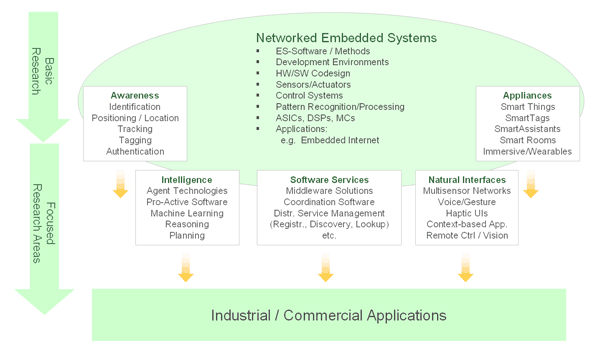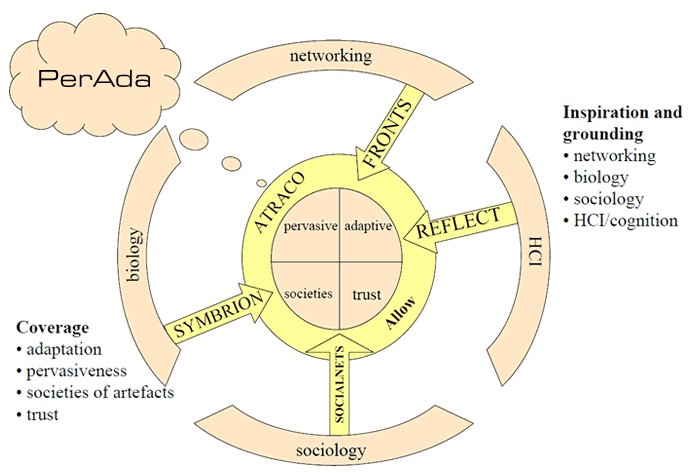http://www.pervasive.jku.at/
Univ.-Prof. Mag. Dr. Alois Ferscha --奥地利约翰开普勒林茨大学(Johannes Kepler University Linz)

Our research is situated in the following areas :
- Software for mobile, ubiquitous and embedded system architectures: Mobile, ubiquitous and wearable computing, wireless embedded systems, multisensor environments, internet appliances, remote viewing and control - focusing on multi-user environments and their modes of interaction, and group/workspace awareness.
- Coordination and interaction: Coordination models and language, formal methods, distributed computing and communication models.
- Development of distributed and embedded system software: Distributed software and algorithms (specification, correctness, termination, complexity analysis), programming paradigms (OO distributed software models), component technologies/frameworks, embedded and real-time software, data structures, development environments, planning and realization of IT-projects.
- Wireless communication systems and communication software: Wireless and mobile communication systems, broadband communication, network architectures (backbone- and access networks, transport nets, LANs), network protocols for wireless communication (IP and MobileIP networks).
- Quality of Service Management and performance analysis: Qualitative and quantitative process models (stochastic process models, nets, stochastic process algebra, recurrence models, time series models, self similarity), QoS management systems, adaptive multimedia systems, network traffic modelling, user interaction modeling, proactive performance tuning.
- Distributed interactive (multiuser) simulation: parallel/distributed discrete event simulation (generating models, experimental design, verification, validation, and confidence analysis, world views), distributed interactive simulation, web-based simulation, agent-based simulation, OO simulation, real-time simulation, simulation-aided multi-user environments.
Our application oriented research is related to the following topics:
- Context Computing: Incorporation of non-stanard I/O devices for proactive, situation dependent behavior enabling implicit interaction with networked devices.
- Distributed multi-user environments: base technologies to support virtual organisations (mobile virtual teams, virtual companies), innovative communication, information and collaboration techniques: Methods, infrastructure and systems for efficient sharing of tasks among geographically dislocated members of teams (dealing with temporal, geographic and mobility barriers). E.g. Groupware, distributed business process management systems, applications to support mobile virtual teams, multimedia-based virtual meeting rooms etc.
- Handheld, PDA and Wearable Computing solutions: Integration in enterprise information systems, team awareness systems, workspace awareness systems, any-time any-place coordination, context-sensitive functionality ('workspace devices'), mobility of devices, users and virtual workspaces.
- Multisensor and immersive environments: Post-WIMP interfaces, position and movement tracking, non-intrusive gathering, filtering and distribution of awareness information, remote view and control applications, telepresence, multiuser virtual/augmented reality.
- Global networks and WWW opportunities for distributed multi-user solutions; core technologies for global networks and their application in commercial, industrial and organizational daily use: Languages and frameworks (Java, XML, XSLT, RDF, embedded Java, RT-Java, SMIL, MPEG, JMF etc.), web meta data and information retrieval (document management, database integration, search engines etc.) "Web collaboration", virtual documents, hypertext systems and agent systems. Interconnectivity & interoperability, network computing, client/server architectures, internet technologies (XML, Java, WAP), device-independent e-Services, real-time multimedia applications like WWW based teaching and learning, collaboration over global networks.
- Wireless and ad-hoc networks: Community WLAN and PAN technologies that are globally used for information sharing, communication and collaboration. System integration, content development, database-interfaces, authentication, cross-platform application development, multimedia applications, collaboration in intranetworks.
- Distributed software systems enabling dislocated cooperative work. Integration of internet- and intranettechnologies, real-time systems, CSCW tools, telepresence tools, multiuser interaction software and www based workflow management systems.
Projects
- OPPORTUNITY (Activity and Context Recognition with Opportunistic Sensor Configurations)
The aim of the project is to develop mobile systems to recognize human activity with dynamically varying sensor setups. We refer to such systems as opportunistic, since they take advantage of sensing modalities that just happen to be available, rather than forcing to deploy specific, application dependent sensor systems.
Homepage: http://www.opportunity-project.eu
Funding: EU FP 7, FET-Open
Duration: 2009 - 2012
Contact: Alois Ferscha
- SOCIONICAL (Complex Socio-Technical System in Ambient Intelligence)
There are a number of projects that acknowledge the tight entanglement between social and technical systems. SOCIONICAL differs from these project in that it jointly deals with complex systems at three levels:
- Interacting social entities
- Interacting technical entities
- Interacting socio-technical entities
It is embedded in AmI (Ambient Intelligence) environments, and it aims at providing a user feedback-loop to control global system behavior, and it relies on realistic multimodal data sources.
Homepage: http://www.socionical.eu
Funding: FP7, FET-Open
Duration: 2009 - 2013
Contact: Alois Ferscha, Andreas Riener, Kashif Zia
- PANORAMA (Pervasive Adaptation Network for the Organisation of the Research Agenda and the Management of Activities)-----PerAda - Pervasive Adaptation Research Projects
The goal of the PANORAMA coordination action is to bring together the wide range of researchers in the field covered by the PERADA proactive initiative, and to build a new community of researchers who can work together on common goals, so ensuring that the research carried out by members of that community is integrated, coordinated and informed.
Homepage: www.perada.eu
Funding: EU FP7, FET
Duration: 2007 - still in progress
Contact: Alois Ferscha
PerAda - Pervasive Adaptation Research Projects
The FET Proactive Initiative on Pervasive Adaptation targets technologies and design paradigms for pervasive information and communication systems, which are capable of autonomously adapting in dynamic environments. The adaptation of individual components will lead to adaptation of the system as a whole and to the emergence of new system behaviours which will be self-configuring, self-healing, self-optimizing and self-protecting. The prospect of building adapting pervasive systems brings many new trust and security challenges to the complex interactions between people, intelligent devices and computers and will need to take account of the non-deterministic and often non-predictable behaviour of people.
PerAda is the Pervasive Adaptation Research Network, coordinated by Edinburgh Napier University, Edinburgh, Scotland - which aims to bring researchers together to discuss and share ideas relevant to Pervasive Adaptation. By joining the discussion, PerAda members gain access to a comprehensive research network to share ideas and resources.
Pervasive Adaptation Overview

Pervasive Adaptation is concerned with technologies used in information and communication systems which are capable of autonomously adapting to highly dynamic user contexts. The development of future systems will increasingly require collaborative systems, involving complex interactions between people, intelligent objects and computers. The real challenge will be the constantly changing networked environment that can no longer be centrally controlled, or even completely understood, by the developer or user. To be successful especially in such highly dynamic environments, systems will have to adapt themselves, taking into account the emergent behaviour of the system. The following research areas are of interest:
- Evolve-able and adaptive pervasive systems, able to permanently adjust, self-manage, evolve and self-organise in order to robustly respond to dynamically changing environments, operating conditions, and purposes or practices of use.
- Networked societies of artefacts that adapt to each other and to changing needs, collectively harness dispersed information and pursue immediate or long-term goals for context-sensitive service delivery in rapidly changing and technology-rich environments.
- Adaptive security and dependability: theories, techniques and architectures, able to cope with the volatile landscape of risks, threats, attacks and context dependent user expectations for privacy and security in evolving and heterogeneous pervasive systems.
- Dynamicity of trust: capabilities for establishing trust relationships between humans and/or machines that jointly act and interact within ad-hoc and changing configurations.
- Security for tiny and massively networked devices: efficient, robust and scalable cryptographic protocols, algorithms and other security and privacy mechanisms, including hardware-based ones, as well as collective, biologically or socially inspired ones.
PerAda 子项目:
- ATRACO - Adaptive and Trusted Ambient Ecologies
Contributing to the realization of trusted ambient ecologies. - FRONTS - Foundations of Adaptive Networked Societies of Tiny Artefacts
Establishing the foundations of adaptive networked societies of small heterogeneous artifacts. - REFLECT - Responsive Flexible Collaborating Ambient
Developing new concepts and means for “pervasive-adaptive systems”. - SOCIALNETS - Social Networking for Pervasive Adaptation
Harnessing adaptive human social structures for tomorrow’s wireless networks. - SYMBRION - Symbiotic Evolutionary Robot Organisms
A platform for exploring artificial evolution and pervasive evolve-ability. - ALLOW - Adaptable Pervasive Flows
Developing a new programming paradigm for human-oriented pervasive applications.



